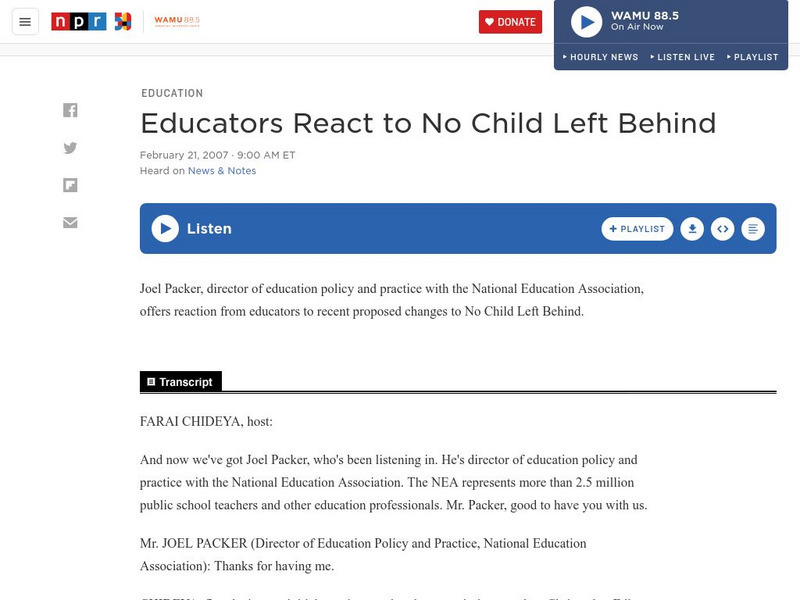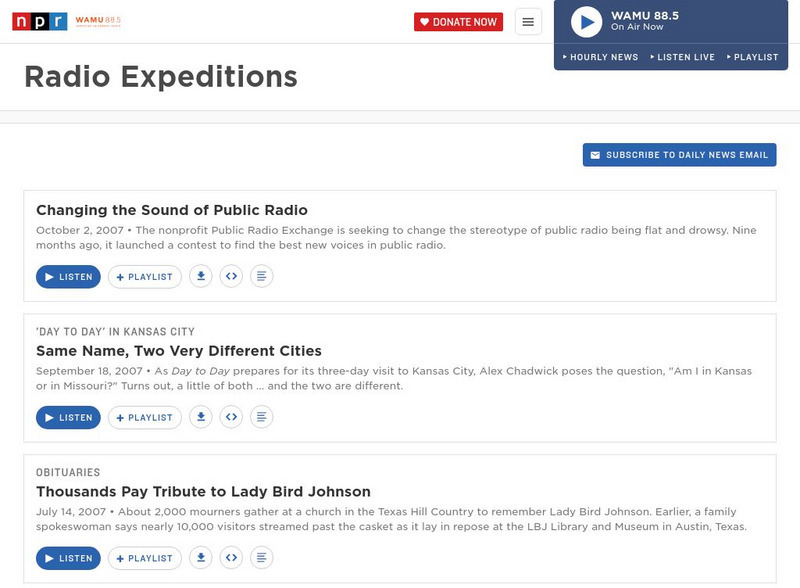Lit2Go
David Copperfield
With 64 chapters and 368,017 words, Charles Dickens' David Copperfield can prove to be a challenge for young readers. Help them out with a resource that not only provides the complete text but an audio version as well.
Center For Civic Education
60 Second Civics: History of Rights Pt. 3: Control of the Press
Throughout history, government has sought control over the press. Find out why on today's podcast.
Center For Civic Education
60 Second Civics: Rights in History Pt. 15: The Printing Press
The Bible was one of the most frequently printed books, and with the Reformation, Christians were encouraged to read it themselves in their own language.
Center For Civic Education
60 Second Civics: The Elements of Democracy: Juries the Press and Public Trials
Juries are vital to democracy. Learn why on today's podcast.
NPR: National Public Radio
Npr: Educators React to No Child Left Behind
Listen to Joel Packer, "director of education policy and practice with the National Education Association," discuss how educators have reacted to proposed changes to No Child Left Behind. From "News & Notes," (January, 2007).
Center For Civic Education
60 Second Civics: Administrative Agencies Pt.20: Citizens and Media as Watchdogs
Explains how the public and the media also act as watchdogs to check the power of administrative agencies.
Center For Civic Education
60 Second Civics: History of Rights Pt. 6: Seditious Libel
Before the American Revolution, the British government used seditious libel laws to control the press.
Center For Civic Education
60 Second Civics: Freedom of Speech Pt. 11: Supreme Court Limits Free Expression
Explains the ways the Supreme Court has set limits to freedom of the press and speech.
Center For Civic Education
60 Second Civics: The Reformation Part 3
A look at how the invention of the printing press aided the Reformation and encouraged freedom of conscience. What impact did the press have on Bible readers. [1 min. 21 secs.]
Center For Civic Education
60 Second Civics: Freedom of Speech Pt. 7: Sedition Act
Freedom of the press has been opposed by some, as reflected in the Sedition Act of 1798, while others like Thomas Jefferson stressed how critical it is in a free society.
Center For Civic Education
60 Second Civics: History of Rights Pt.5: "No Free Schools Nor Printing Presses"
The English governor of Virginia said: "Thank God there are no free schools nor printing presses, and I hope we shall not have them these hundred years."
Center For Civic Education
60 Second Civics: History of Rights Pt. 9: First Amendment and Right to Know
The public has a right to know how the government is doing its job, but even that right has limits.
Center For Civic Education
60 Second Civics: History of Rights Pt. 4: Prior Restraint
What is prior restraint? Find out on today's podcast.
NPR: National Public Radio
Npr: Report Recommends Changes to 'No Child' Act
In 2007, there are plans to make changes to the No Child Left Behind Act, and, as expected, there are debates surrounding this and the related budget changes. Listen to a "News & Notes" report on this and the reactions of the...
University of Virginia
Miller Center at Uva: Presidential Recordings Program: Watergate Collection
This website provides a selection of transcripts related to Watergate. Most are from the meeting tapes and the sound quality is often poor. Earlier versions of a number of these have been previously published either by the various...
Science Friday Initiative
Science Friday: Phil Mickelson Takes a Swing at Science
Mickelson, an advocate for math and science education, says science sharpens his golf game, too.
NPR: National Public Radio
Npr: Radio Expeditions
This resource features past radio stories that probe into interesting features of countries all over the globe.
Center For Civic Education
60 Second Civics: Freedom of Speech Pt. 9: Government Suppression of Speech
Discusses the history of government suppression of free speech and how things have improved in recent decades.
Center For Civic Education
60 Second Civics: Freedom of Speech Pt. 14: Restrictions Must Be Clear
The Supreme Court determined that restrictions to free speech must be very clear so that everyone, including the police, understands them.
Center For Civic Education
60 Second Civics: Freedom to Assemble Pt. 2: Rights of Assembly and Petition
The First Amendment supports the right to assemble and to petition by protecting the right to form one's own opinions.
Center For Civic Education
60 Second Civics: History of Rights Pt. 6: Seditious Libel
Amusing oneself at the expense of the president had a heavy price in post-Revolutionary America.
Center For Civic Education
60 Second Civics: Freedom of Speech Pt. 4: Advancement of Knowledge
Discusses how knowledge and ideas can only be advanced when all points of view are considered, which is why freedom of speech and expression are so important.
Center For Civic Education
60 Second Civics: Freedom of Speech Pt. 5: Social Change and Individual Rights
Freedom of expression permits groups to voice their ideas and beliefs, and try to influence public opinion and effect social change in a peaceful manner.
Center For Civic Education
60 Second Civics: Freedom of Speech Pt. 8: John Peter Zenger and Seditious Libel
Covers the case of John Peter Zenger who printed an article in colonial America for which he was accused of seditious libel.
Other popular searches
- Elementary Education News
- Religious Education News
- Education News Paper
- Newspapers in Education
- Education Reform Newsletters
- Education News and Issues
- News Technologies in Education






